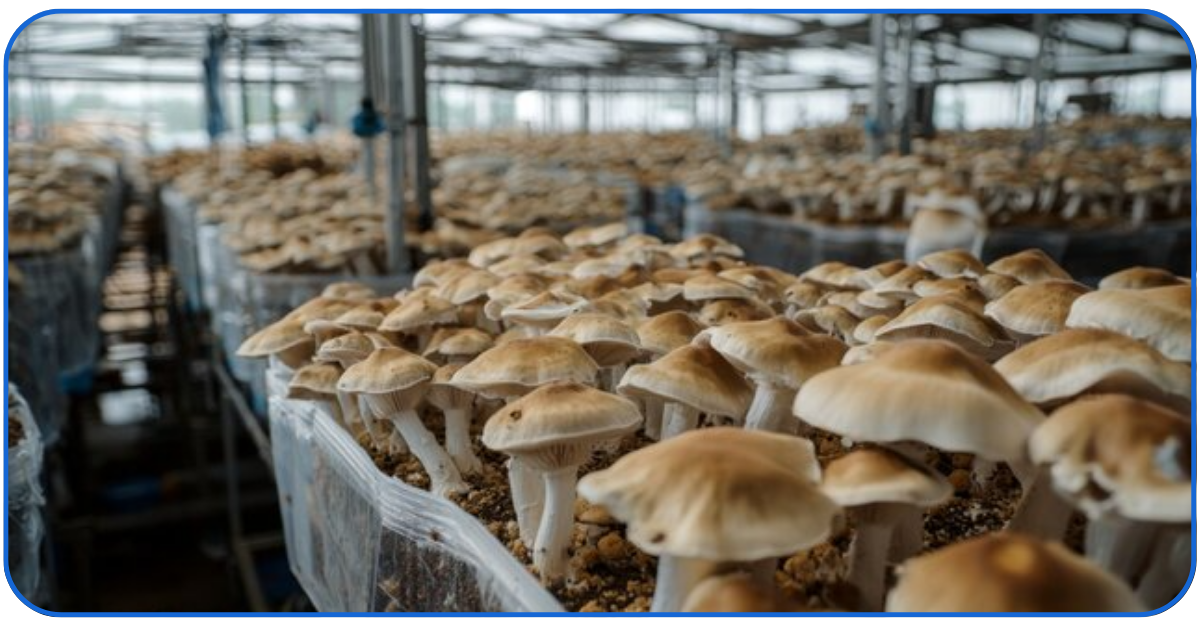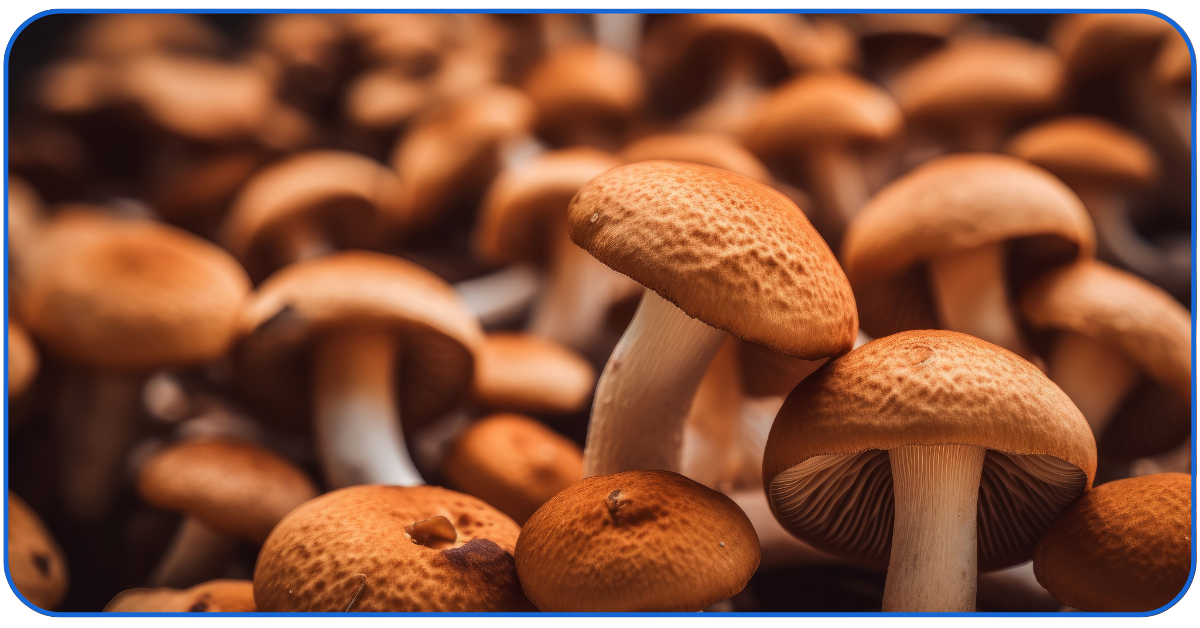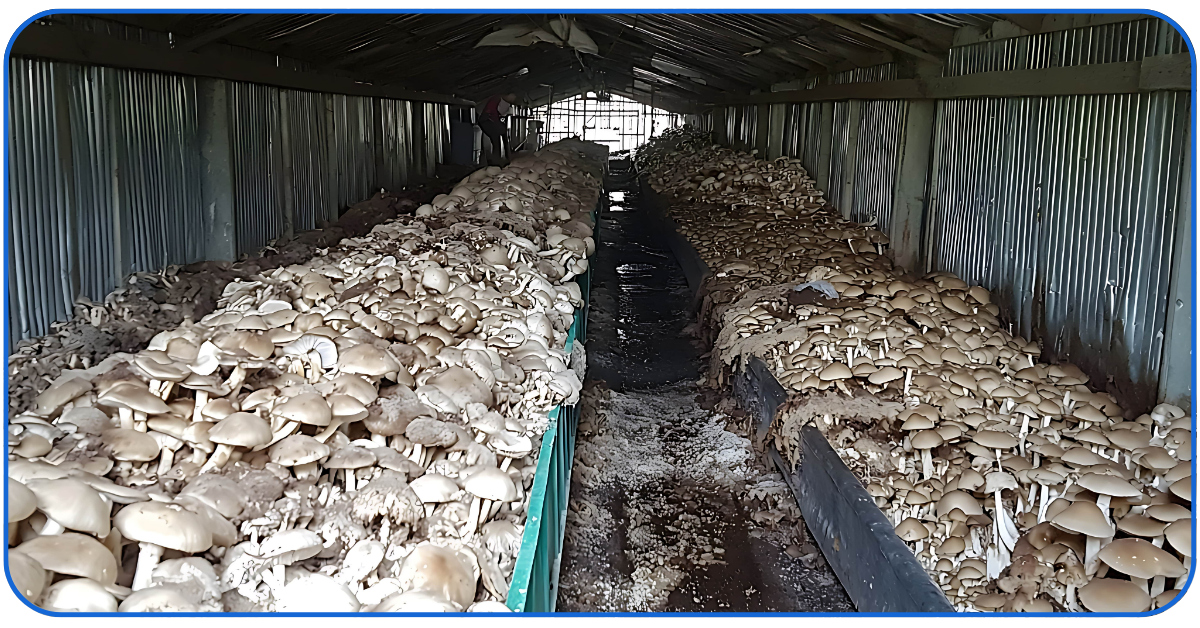These days, the mushroom market is booming. From medicinal to food purposes, people are going crazy for most categories of mushrooms. And when we look at the market from the prism of entrepreneurs, it is profitable for them as well. You can start a mushroom business with minimal investment and expect good returns.
The market is expected to cross $115 billion by 2030, so it’s the right time for you to try your hand at this agricultural venture. In this guide, you will find answers to questions like- How to start a mushroom-growing business, the problems associated, and which variety of mushroom is in the highest demand.
Why is the mushroom farming business a great idea?

When there’s thunder, there’s lightning! So, what’s thundering about this business? Let me break it down for you:
- It enjoys huge market demand owing to its taste and uses. The gourmet varieties like shiitake and oyster are winning the game.
- It is counted among the most profitable agricultural ventures as it brings higher returns with less capital. All you need to do is have the right setup and knowledge in the beginning and you are done. Keeping updated with market trends is inevitable for every business.
- Unlike other crops, you can grow mushrooms the entire year, promising you a year-round income. The mushroom is in demand in every season, so you can produce accordingly.
- Another thing that makes mushroom farming lucrative is sustainability. Some varieties of mushrooms can be grown on waste products like straw and coffee grounds.
Read More: How to Start a Catering Business – An Ultimate Guide
Everything about Mushroom Cultivation
Before we talk about the complete process of “How to start a mushroom business”, let’s understand some important points related to mushroom cultivation.
Types of Mushrooms
The first thing you have to decide is the type of mushroom you want to cultivate. You can choose considering market demand, your expertise, and infrastructure.
- Oyster Mushroom
If you want to start on a small scale, start with oyster mushrooms as they grow faster and are in demand.
- Reishi Mushroom
If you want to grow mushrooms for medicinal purposes, go for Reishi or Cordyceps. These are high-value mushrooms, so consider the demand factor in your area before starting the production.
- Button Mushroom
If you are living in cool areas, button mushrooms could be the right choice for you.
- Shiitake Mushroom
This is one of the finest types of mushrooms due to its rich flavour and nutritional benefits. They have a strong, woody and umami-rich taste.
Methods of Cultivation
Now, learn about the cultivation methods of mushrooms:
- Sawdust-based cultivation
- Straw-based cultivation
- Coffee-grounds waste
Read More: 11 Best Digital Marketing Strategies for Agricultural Industry
Setting up the farm
One of the most important steps in our guide on “How to start a mushroom business” is setting up the farm.
- You can start mushroom farming with a limited space, which could be an unused room. All you need is to fulfil the conditions required for its growth.
- Temperature: 13 degrees Celsius to 18 degrees Celsius (may vary with the variety of mushroom)
- Ventilation: Dire need for proper airflow
- Humidity: Mushrooms grow in high humidity. It should be around 80%-90%.
- Talking about equipment, you don’t need large equipment for mushroom cultivation for small farms. But you will require some items for production:
- Temperature and humidity controlling equipment
- Growing containers
- Substrate materials and sterilisation equipment
- Watering equipment
- You must be worried about the initial costs of starting a mushroom farming business. So, here is the breakdown:
- Growing containers– Rs. 4000- Rs. 8000
- Substrate Materials– Rs. 3000- Rs. 15000
- Temperature and Humidity Controlling Equipment– Rs. 4000- Rs. 20000
- Sterilisation Equipment– Rs. 3000- Rs. 12000
- Miscellaneous Cost– Rs. 4000- Rs. 8000
The average cost to start a mushroom farm could be Rs. 20,000- Rs. 50,000.
A step-by-step guide to starting a Mushroom Farming Business

Now, let me walk you through the complete guide to starting a mushroom farming business.
Market Research
Before starting any business, you have to research the market to understand the demand, supply and customer requirements for a flawless business plan. The same is the case wth the mushroom-growing business.
Study carefully about your local competitors, their varieties and customer requirements. Try to find loopholes in the current position of the market and try to fill that gap with your business. It could even be your marketing point.
Choose your niche
After researching the market, the next step is to choose your niche or the variety of mushrooms you want to grow. In the previous section, we discussed the different types of mushrooms. Choose the variety according to your cultivation expertise and market demand. Oyster mushrooms are in demand everywhere, so you can start with that. These are used in soups, curries, and pasta, so you can easily serve local restaurants.
Draft a business plan.
To start a mushroom business, you need a full-fledged business plan for unambiguous functioning. Your business plan should include a company description, an executive summary, information about products and a marketing strategy. It should include details about the management team, operations and financial projections.
Make sure your business plan is flexible enough to make changes according to the market requirements.
Set your growing space
The next step is to set your growing space. We discussed the conditions required for the cultivation of mushrooms. Make sure your growing space can fulfil those conditions for operational efficiency.
Find your suppliers
To grow mushrooms, you require raw material, and you have to look for suppliers right at the beginning of the process. There is a long list of materials like grain spaw, substrate materials (straw, sawdust, coffee-grounds waste), containers, supplements, and sterilisation equipment. You have to find trustworthy suppliers for the same. Also, you should invest in quality products, so you don’t have to spend on repairs every now and then.
Before finalising your supplier, consider the following:
- Customer reviews
- Discounts and pricing
- Shipping time
- Technical services
Register your business
The next step is to get your business registered and obtain an Employer Identification Number (EIN). An Employer Identification Number (EIN) is a unique tax ID issued by the IRS to identify business entities. Even mushroom farm LLCs without employees typically need an EIN for federal and state tax filings.
Applying through IRS website is free and fast. The application requires the business name, owner details, and designating a responsible party for IRS contact—usually a manager or officer.
Once issued, the EIN must be used on tax forms (like Form 1065) and for opening business bank accounts. LLCs must also register for state-level taxes and permits, which vary by location (e.g., CDTFA in California).
Getting an EIN and completing state registration ensures legal and tax compliance for mushroom farm businesses.
Food Safety Protocols
As you’re growing an edible product, you should ensure the safety and quality of mushrooms by following food safety protocols.
- Certification in Good Agricultural Practices (GAP): Ensures that farming methods meet safety and quality standards.
- Implementation of a HACCP Plan: Identifies and manages potential food safety risks at key stages.
- Maintaining Strict Hygiene and Sanitation: It involves regular cleaning and personal hygiene practices to prevent contamination.
- Use of Temperature-Controlled Storage and Transport: Keeps mushrooms fresh and safe during handling and delivery.
- Establishing Traceability and Product Recall Systems: Enables tracking of each batch and quick response in case of any safety issue.
- Routine Testing for Contaminants: Verifies the absence of harmful substances like bacteria, pesticides, or heavy metals.
Develop Your Marketing Strategy
No business can grow without marketing. Before starting a mushroom farming business, you have to plan your marketing strategy.
- Choose a memorable name, logo, and message that highlights what sets your mushrooms apart, like being organic or locally grown.
- Create a website and stay active on social media to share farm updates, product photos, and engage with customers.
- Use local markets, home delivery, or partner with restaurants and stores for consistent sales.
- Use eco-friendly packaging and a reliable delivery system to keep your mushrooms fresh and appealing.
Customer Grievance Redressal Mechanism
You can start a mushroom business, scale it and earn a lot out of it. But without a well-planned customer grievance redressal mechanism, you cannot function in the long run. Brands that take their customers’ feedback seriously are appreciated by the public. They become loyal to the brands that address their problems and solve them in time. Make sure you have a well-defined grievance redressal mechanism and don’t forget to mention it on your website(if you have any).
Common Problems Associated with the Mushroom Business

Starting a mushroom farming business is not all sunshine and rainbows. There are some problems associated with the business that you should consider before initiating your startup.
Contamination Problem
One thing you must know is that mushrooms are sensitive to bacterial and fungal diseases. You have to maintain hygiene during the growing period. Also, make sure you are using safe pest control medicines like neem oil to prevent your yield from flies, rodents and mites.
Time Management Issues
Though mushroom-growing is not expensive, it requires time and attention. You have to be careful during the growing period, as overripened mushrooms can spoil the entire batch.
As your operation grows, you’ll likely have a team handling different tasks like substrate preparation, fruiting, and harvesting, so the most efficient approach would be to use time tracking software such as My Hours during this phase. It helps you monitor how long each task takes, ensure team members stay on schedule, and maintain consistent results across all cultivation stages.
Market Competition
With the increasing demand for mushrooms, there is a risk of the market getting saturated. To avoid that, make sure you develop good connections with customers, local restaurants and vendors. You can trade on your quality as well. Keep educating people about your clean growing process to win their trust.
Environmental Factors
You have to be particular while choosing the growing space as mushrooms are sensitive to environmental factors like temperature, humidity and ventilation.
Conclusion
Starting a mushroom-growing business is a profitable idea if planned and implemented carefully. By finding the right varieties according to your expertise and studying market demand, you can succeed in this market. Make sure you are not compromising the quality of your product and are continuously working for improved customer service.
Remember, brands come and go. People remember brands that not just offer a quality product but impeccable after-sales service as well.
You must have got answers to all your questions related to “How to start a mushroom business” in this complete guide.
Tips for You
- Start with 2 or 3 varieties of mushrooms for production expertise.
- A business plan is not a passive document. It is the life and soul of your business, so keep updating.
- Use AI for inventory management, record keeping and the generation of Standard of Procedure (SOP).
- Keep educating your customers about the uses of mushrooms. This will help you connect better with your customers.
- Scale wisely. Expand your business when you have enough resources.
Additional Readings:
An Absolute 8-Step Guide on “How to Start a Laundry Business?
How to Start a Construction Business- Build Big in 8 Steps
FAQ
Q1- How can you scale a mushroom farming business?
You all know expanding a business requires good planning. So, before you plan to scale your mushroom-growing business, decide on the path and work on it cautiously. You can scale by augmenting production, increasing variety, improving infrastructure, accessing more locations, or simply optimising operations.
Q2- Is mushroom a profitable business in India?
Yes, mushroom farming could be profitable if done with proper planning. Owing to its lower investment and higher demands, a mushroom business promises great returns.
Q3- Is a mushroom a medicinal plant?
First of all, a mushroom is a fungus. There are a few varieties of mushrooms that have medicinal properties, like Turkey Tail, Reishi, Chaga, and Lion’s Mane.
Q4- How to market a mushroom business online?
You can follow a conventional marketing method to promote a mushroom business online. Start with a catchy logo and a website. Use social media, collaborate with influencers, run paid ads, and list yourself on other platforms like Amazon and BlinkIt.
Q5- What licenses are required for a mushroom business?
Different types of licenses are required at different stages and purposes of the business. If you want to sell mushrooms as a food product, you need an FSSAI license, and a shop and establishment license is required for a commercial setup. If you want to export mushrooms, you need an export license and a Pharma/ AYUSH license for medicinal purposes. It depends on the type of mushroom business plan and which license you need to obtain.




